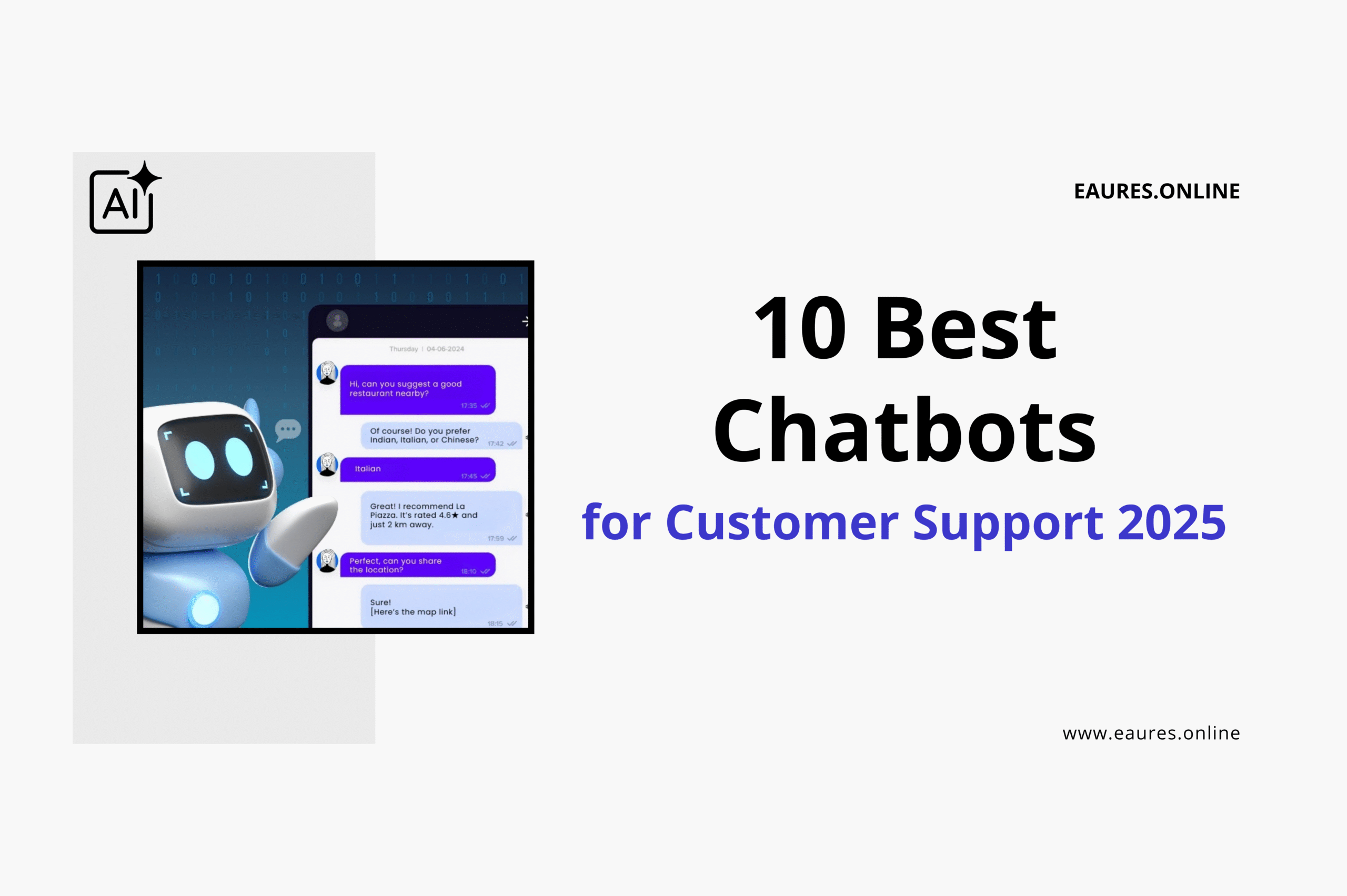Table of Contents
10 Best Chatbots for Customer Support 2025
Introduction
In 2025, customer support has evolved from traditional channels like phone and email to include dynamic, AI-powered chatbots. These chatbots are transforming the way businesses engage with their customers by providing instant responses, personalized support, and 24/7 availability. In this article, we explore the 10 best chatbots for customer support that are leading the charge in customer service automation, helping businesses streamline operations and enhance customer experiences.
Why Chatbots Are Essential for Customer Support
The rise of chatbots in customer support is not just a trend but a necessity for businesses aiming to stay competitive in an increasingly digital landscape. As customer expectations evolve, they demand quick, efficient, and personalized assistance. Chatbots meet these needs by providing immediate responses, reducing wait times, and offering scalable solutions for businesses of all sizes. They can handle repetitive tasks, offer self-service options, and escalate complex issues to human agents when needed.
Furthermore, chatbots can be integrated with various channels like websites, social media platforms, and mobile apps, ensuring that customers receive consistent service across all touchpoints. In 2025, chatbots are expected to play a crucial role in enhancing customer satisfaction while reducing operational costs.

Top 10 Best Chatbots for Customer Support in 2025
1. Zendesk AI Chatbot
Zendesk has long been known as one of the most trusted platforms for customer service, and its AI-powered chatbot is no exception. This chatbot provides seamless integrations with Zendesk’s customer service tools, offering businesses a comprehensive support solution. It’s capable of answering customer inquiries, providing personalized recommendations, and automating routine tasks.
The Zendesk chatbot can be customized to meet the specific needs of businesses, offering automated responses in multiple languages. Its easy-to-use interface and powerful AI make it a top contender among the best chatbots for customer support in 2025.
- Key Features:
- AI-driven automation
- Multi-language support
- Seamless integration with Zendesk support tools
- Customizable workflows
Explore more on Zendesk’s AI Chatbot
2. ProProfs Chat
ProProfs Chat is another excellent choice for businesses looking for a powerful customer support chatbot. It stands out due to its easy-to-use interface and robust set of features. This chatbot can help businesses provide real-time customer support, track visitor behavior, and trigger proactive chats based on user actions.
It also integrates well with CRM systems and offers customizable templates, making it an excellent choice for businesses seeking an efficient and flexible customer service solution.
- Key Features:
- Real-time chat support
- Visitor tracking and proactive engagement
- CRM integration
- Customizable templates
Discover more about ProProfs Chat
3. Tidio
Tidio is an AI-powered chatbot that simplifies customer support by offering a seamless integration with popular messaging platforms like Facebook Messenger, WhatsApp, and Instagram. This makes it a great option for businesses looking to engage with customers on various social media platforms.
Tidio provides automated responses, live chat capabilities, and customer service insights, all within a unified platform. With a user-friendly dashboard and a variety of automation features, it’s an excellent choice for small to medium-sized businesses.
- Key Features:
- Multi-platform integration
- Automated responses and live chat
- User-friendly dashboard
- AI-powered insights
Check out Tidio’s chatbot features
4. Freshchat by Freshworks
Freshchat, part of the Freshworks suite, is a modern messaging platform that offers advanced AI-powered chatbots. This chatbot is highly customizable and can help businesses automate customer support, resolve issues quickly, and drive better customer engagement.
Freshchat’s chatbot can be programmed to handle customer inquiries, send personalized messages, and even book appointments. Additionally, its integration with other Freshworks tools makes it a powerful option for businesses looking to unify their customer support systems.
- Key Features:
- AI-driven automation
- Multi-channel support (website, mobile, social media)
- Integration with Freshworks suite
- Customizable workflows
5. LivePerson
LivePerson is a leading conversational AI platform that focuses on delivering human-like interactions through its chatbot. It helps businesses deliver real-time, intelligent support to their customers via multiple messaging platforms, including SMS, WhatsApp, and web chat.
The LivePerson chatbot is equipped with natural language processing (NLP) technology, allowing it to understand and respond to complex customer inquiries with a high degree of accuracy.
- Key Features:
- Advanced NLP capabilities
- Multi-platform support
- Real-time engagement
- AI-powered analytics
Find out more about LivePerson

6. Chatfuel
Chatfuel is a popular choice for businesses looking to create conversational AI chatbots for Facebook Messenger and Instagram. This chatbot allows businesses to build automated customer service flows, manage customer queries, and offer personalized support.
With its user-friendly interface and integration with many third-party tools, Chatfuel helps businesses scale their customer support operations without requiring extensive technical knowledge.
- Key Features:
- AI-powered messaging on Facebook and Instagram
- Automated customer service flows
- Integration with third-party tools
- Easy-to-use platform
7. ManyChat
ManyChat is another excellent chatbot for businesses seeking to automate customer support through Facebook Messenger and SMS. It offers powerful automation features, such as keyword-based triggers, and provides businesses with detailed analytics to improve customer interactions.
ManyChat also integrates with popular CRM systems and marketing tools, making it a great choice for businesses that want to deliver personalized support at scale.
- Key Features:
- Keyword-based triggers
- Integration with CRM and marketing tools
- Multi-channel support
- Detailed analytics and reporting
8. Botpress
Botpress is an open-source chatbot platform that allows businesses to create custom AI-driven chatbots. It’s an excellent choice for companies with specific customer service requirements, as it offers full control over the design and functionality of the chatbot.
Botpress’s advanced NLP features and modular architecture allow businesses to create highly customized chatbots that can handle everything from basic queries to complex support scenarios.
- Key Features:
- Open-source platform
- Advanced NLP capabilities
- Highly customizable
- Modular architecture
9. Intercom
Intercom is a popular messaging platform known for its live chat and chatbot functionality. It provides businesses with a powerful set of tools for customer engagement, including automated workflows, ticketing, and in-app messaging.
The chatbot on Intercom can handle everything from lead generation to customer support, making it a versatile choice for businesses looking to streamline their customer support operations.
- Key Features:
- Automated workflows
- Lead generation and customer support
- In-app messaging
- Integration with popular tools
Check out Intercom’s chatbot features
10. Aivo
Aivo offers a smart chatbot that leverages AI and machine learning to provide automated customer support. The platform offers personalized interactions and integrates seamlessly with various channels like WhatsApp, Facebook, and live chat.
Aivo’s chatbot is designed to learn from each customer interaction, improving its responses over time and offering businesses a scalable solution for their customer support needs.
- Key Features:
- AI and machine learning-powered
- Personalized customer interactions
- Multi-channel support
- Scalable solution for growing businesses
How to Choose the Best Chatbot for Your Business
When selecting the best chatbot for customer support, consider factors like:
- Integration capabilities: Make sure the chatbot can integrate with your existing CRM, live chat, and help desk tools.
- Customizability: Look for chatbots that can be tailored to meet your specific business needs.
- Scalability: Choose a chatbot that can grow with your business and handle increased customer queries.
- Support channels: Ensure that the chatbot supports the messaging platforms most important to your customers, such as social media, SMS, or live chat.

Frequently Asked Questions (FAQ) about Chatbots for Customer Support
1. What are chatbots for customer support?
Chatbots for customer support are AI-powered systems designed to interact with customers in real-time, providing them with instant assistance through automated responses. They can handle various tasks such as answering frequently asked questions (FAQs), resolving common customer service issues, and guiding users through different processes. Chatbots are typically integrated into websites, mobile apps, and social media platforms, enabling businesses to deliver 24/7 support to their customers.
These chatbots use machine learning and natural language processing (NLP) to understand customer queries and provide contextually relevant responses. They help improve the overall efficiency of customer service departments by automating repetitive tasks, reducing wait times, and enhancing the customer experience.
2. Why should my business use a chatbot for customer support?
In 2025, chatbots are considered essential tools for businesses looking to enhance their customer support operations. There are several reasons why using a chatbot is beneficial for your business:
- 24/7 Availability: Chatbots can provide round-the-clock customer support without the need for human agents to be always present. This ensures that customers can get assistance whenever they need it.
- Cost-Effective: By automating routine tasks, chatbots can help businesses reduce the number of customer support agents needed, ultimately saving costs on labor and training.
- Improved Customer Experience: Customers today expect fast responses. Chatbots can instantly answer questions, resolve issues, and provide personalized support, helping to improve overall customer satisfaction.
- Scalability: As your business grows, chatbots can handle an increasing number of customer interactions without additional resources. This scalability is crucial for businesses looking to expand while maintaining quality support.
3. What features should I look for in a chatbot for customer support?
When evaluating a chatbot for customer support, here are the key features you should look for:
- Natural Language Processing (NLP): A chatbot powered by NLP will be able to understand and respond to human language in a more natural and conversational way. This is crucial for providing an engaging and human-like experience.
- Multi-Platform Support: Ensure that the chatbot can be integrated with the communication channels your customers use, such as your website, social media platforms (Facebook, Instagram, WhatsApp), and mobile apps.
- Automation and AI-Powered Workflow: The chatbot should be able to automate routine tasks, such as answering FAQs, processing orders, or directing customers to the right department. It should also be capable of handling escalations when needed.
- Personalization: A good chatbot should be able to remember customer preferences, offer tailored responses, and provide a personalized experience based on previous interactions.
- Analytics and Reporting: The ability to track and analyze chatbot performance is essential for identifying areas for improvement and ensuring your chatbot is effectively meeting customer needs.
4. Can chatbots replace human customer support agents?
While chatbots can handle many aspects of customer service, they are not a complete replacement for human agents. Chatbots are best suited for addressing routine queries, automating tasks, and providing instant responses. However, there are still complex customer issues that require human empathy, understanding, and problem-solving skills.
In an effective customer service strategy, chatbots and human agents should work together. Chatbots can handle simple queries and escalate more complicated issues to human agents when necessary. This hybrid approach ensures that customers receive both fast responses and high-quality service.
5. How do chatbots learn and improve over time?
Chatbots improve over time through a process called machine learning. Initially, they rely on predefined responses and rules, but as they interact with more customers, they gather data from each conversation. This data helps the chatbot understand customer behavior, preferences, and intent, allowing it to provide more accurate responses.
The learning process is continuously refined with the help of NLP algorithms, which enable the chatbot to understand context, detect sentiment, and interpret different forms of communication. Many chatbots are also able to self-optimize based on feedback, ensuring that their responses become more relevant and helpful over time.
6. Are chatbots secure?
Security is a critical consideration when implementing chatbots, especially when they are handling sensitive customer information. The best chatbots for customer support are equipped with robust security measures, such as encryption, authentication, and secure data storage.
To ensure maximum security, businesses should select chatbots that comply with data protection regulations (such as GDPR, CCPA) and use industry-standard security protocols. It’s also important to regularly update the chatbot software to address any vulnerabilities that could be exploited by cybercriminals.
7. How can I measure the effectiveness of my chatbot?
To determine whether your chatbot is performing well, you should track key performance indicators (KPIs) such as:
- Customer Satisfaction (CSAT): After interacting with the chatbot, customers should have the option to rate their experience. High CSAT scores indicate that the chatbot is meeting customer expectations.
- Response Time: A key metric for chatbots is how quickly they can respond to customer queries. Faster response times generally result in higher customer satisfaction.
- Resolution Rate: This measures the percentage of queries that the chatbot can resolve without escalating them to a human agent. A high resolution rate indicates that the chatbot is effective at handling customer inquiries.
- Escalation Rate: This measures how often the chatbot needs to escalate issues to a human agent. A low escalation rate typically means the chatbot is successfully resolving most issues.
- Retention Rate: If the chatbot is integrated into a customer support strategy, it should help improve customer retention by providing efficient and personalized support.
8. Can chatbots handle multiple languages?
Yes, many modern chatbots are equipped with multi-language support, enabling them to communicate with customers in their preferred language. This is particularly important for businesses that have a global customer base or operate in multilingual regions.
Some chatbots, such as those offered by Zendesk and Freshchat, come with built-in language translation features, while others can be customized to support specific languages. AI-driven chatbots that leverage NLP can also improve their language capabilities over time, becoming more proficient in understanding and responding to a variety of languages.
9. What are the costs of using chatbots for customer support?
The cost of implementing a chatbot for customer support can vary depending on several factors, such as the platform you choose, the complexity of the chatbot, and the number of users you need to support. Here are some common pricing models for chatbots:
- Subscription-based: Many chatbot providers offer subscription plans based on the number of users or interactions. These plans typically include access to core features and support.
- Pay-per-interaction: Some platforms charge based on the number of customer interactions the chatbot handles, making it a scalable option for businesses with varying support needs.
- Custom Solutions: For businesses requiring highly specialized chatbots, custom-built solutions may come at a higher upfront cost. These chatbots are designed to meet specific business requirements and are tailored to deliver more advanced functionality.
In general, while the initial setup cost of a chatbot may seem significant, the long-term savings on customer support staff and the improved customer experience can make it a worthwhile investment.
10. How do I integrate a chatbot into my existing customer support system?
Integrating a chatbot into your existing customer support system is typically straightforward, especially if you choose a chatbot platform that offers seamless integrations with popular customer service tools like CRM systems, live chat platforms, and help desks.
Most chatbot providers offer integration guides and APIs that allow businesses to connect their chatbot with existing systems. For instance, platforms like Zendesk and Freshchat offer native integrations with other customer service tools, reducing the complexity of the integration process.
Additionally, chatbots can be set up to work alongside human agents, escalating more complex queries to live support. This ensures that customers receive the best of both automated and human assistance.

Conclusion
As customer expectations continue to rise, businesses must adapt by leveraging AI-driven tools like chatbots to enhance their customer support strategies. The best chatbots for customer support in 2025 offer powerful features, including multi-platform support, advanced NLP, and customizable workflows. By implementing a chatbot, businesses can improve customer satisfaction, reduce operational costs, and scale their support services efficiently.
Whether you’re a small business looking to automate routine queries or a large enterprise seeking to streamline support across multiple channels, the chatbots listed in this article provide a wide range of options to meet your needs. By choosing the right chatbot, businesses can enhance their customer service experience while staying ahead of the competition.
Useful Links for Chatbot and AI Tools
- Explore the Best AI Assistants for Small Businesses in 2025: Compare top AI assistants for small businesses to automate workflows, save time, and enhance productivity.
- Boost Your Productivity with AI Tools: Discover the best AI tools for productivity in 2025, offering automation, writing, and meeting intelligence solutions.
- Top AI Tools for Students in 2025: Explore AI tools for students, helping with writing, research, and smart study tips.
- Best AI Apps for Content Creators: Discover AI apps for content creators in 2025, from design tools to video editing and publishing platforms.





jiNhIVygTcFayaCiZuBvT